Fleurs du Mal Magazine


Or see the index
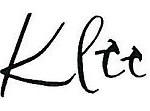
Paul Klee
(1879-1940)
Eins durch tausend
Ein
Tausend Schwein
steht in Pein
ohne neun
hundert neun
und neunzig sein
es gleichen Schwein
allein
Paul Klee Gedicht, 1928
fleursdumal.nl magazine
More in: Archive K-L, Expressionism, Klee, Paul
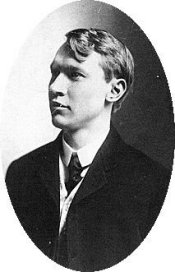
Vachel Lindsay
(1879-1931)
A Rhyme About An Electrical Advertising Sign
I look on the specious electrical light
Blatant, mechanical, crawling and white,
Wickedly red or malignantly green
Like the beads of a young Senegambian queen.
Showing, while millions of souls hurry on,
The virtues of collars, from sunset till dawn,
By dart or by tumble of whirl within whirl,
Starting new fads for the shame-weary girl,
By maggoty motions in sickening line
Proclaiming a hat or a soup or a wine,
While there far above the steep cliffs of the street
The stars sing a message elusive and sweet.
Now man cannot rest in his pleasure and toil
His clumsy contraptions of coil upon coil
Till the thing he invents, in its use and its range,
Leads on to the marvellous CHANGE BEYOND CHANGE.
Some day this old Broadway shall climb to the skies,
As a ribbon of cloud on a soul-wind shall rise.
And we shall be lifted, rejoicing by night,
Till we join with the planets who choir their delight.
The signs in the street and the signs in the skies
Shall make a new Zodiac, guiding the wise,
And Broadway make one with that marvellous stair
That is climbed by the rainbow-clad spirits of prayer.
Vachel Lindsay poetry
fleursdumal.nl magazine
More in: Archive K-L, CLASSIC POETRY, Lindsay, Vachel
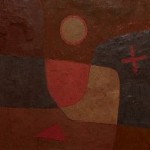
Paul Klee
(1879-1940)
In einem Zimmer gefangen…
In einem Zimmer gefangen
große Gefahr
kein Ausgang
Da: ein offenes Fenster, hinauf, abstoßen:
ich fliege frei,
aber es regnet fein,
es regnet fein,
es regnet,
regnet,
regnet…
regnet…
Paul Klee Gedicht
fleursdumal.nl magazine
More in: Archive K-L, Expressionism, Klee, Paul

Paul Klee
(1879-1940)
Ein Gedicht mit den Reimen
Augen
Brust
Lust
Nacht
gelacht
Schlaf
traf
Gesellen
bestellen
Bäumen
träumen
Herzensnacht
Paul Klee Gedicht, 1901
fleursdumal.nl magazine
More in: Archive K-L, Expressionism, Klee, Paul

Vachel Lindsay
(1879-1931)
Abraham Lincoln Walks At Midnight
It is portentous, and a thing of state
That here at midnight, in our little town
A mourning figure walks, and will not rest,
Near the old court-house pacing up and down,
Or by his homestead, or in shadowed yards
He lingers where his children used to play,
Or through the market, on the well-worn stones
He stalks until the dawn-stars burn away.
A bronzed, lank man! His suit of ancient black,
A famous high top-hat and plain worn shawl
Make him the quaint great figure that men love,
The prairie-lawyer, master of us all.
He cannot sleep upon his hillside now.
He is among us:— as in times before!
And we who toss and lie awake for long
Breathe deep, and start, to see him pass the door.
His head is bowed. He thinks on men and kings.
Yea, when the sick world cries, how can he sleep?
Too many peasants fight, they know not why,
Too many homesteads in black terror weep.
The sins of all the war-lords burn his heart.
He sees the dreadnaughts scouring every main.
He carries on his shawl-wrapped shoulders now
The bitterness, the folly and the pain.
He cannot rest until a spirit-dawn
Shall come;—the shining hope of Europe free:
The league of sober folk, the Workers’ Earth,
Bringing long peace to Cornland, Alp and Sea.
It breaks his heart that kings must murder still,
That all his hours of travail here for men
Seem yet in vain. And who will bring white peace
That he may sleep upon his hill again?
Vachel Lindsay poetry
fleursdumal.nl magazine
More in: Archive K-L, CLASSIC POETRY, Lindsay, Vachel

Paul Klee
(1879-1940)
Wasser
Wasser
darauf Wellen,
darauf ein Boot,
darauf ein Weib,
darauf ein Mann.
Paul Klee poetry [1906]
fleursdumal.nl magazine
More in: Archive K-L, Expressionism, Klee, Paul
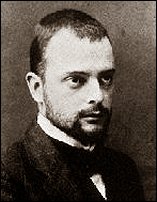
Paul Klee
(1879-1940)
Wasser, darauf Wellen
Wasser
darauf Wellen,
darauf ein Boot,
darauf ein Weib,
darauf ein Mann.
Spruchgedicht von Paul Klee, 1906
fleursdumal.nl magazine
More in: Archive K-L, Expressionism, Klee, Paul
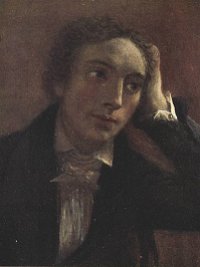
John Keats
(1795-1821)
To Mrs Reynolds’s Cat
Cat! who hast passed thy grand climacteric,
How many mice and rats hast in thy days
Destroyed? How many tit-bits stolen? Gaze
With those bright languid segments green, and prick
Those velvet ears – but prithee do not stick
Thy latent talons in me, and up-raise
Thy gentle mew, and tell me all thy frays
Of fish and mice, and rats and tender chick.
Nay, look not down, nor lick thy dainty wrists –
For all thy wheezy asthma, and for all
Thy tail’s tip is nicked off, and though the fists
Of many a maid have given thee many a maul,
Still is that fur as soft as when the lists
In youth thou enteredst on glass-bottled wall.
John Keats poetry
fleursdumal.nl magazine
More in: Archive K-L, Keats, John

Paul Klee
(1879-1940)
Gedichte epigrammatischer Natur mit den Reimen
gereimt
geleimt
große Pein
überflüssig zu sein.
Ich glaubte, es müßte mir wenigstens gelingen, mich selber
lächerlich zu machen.
so ein leidend Haupt
gelber
glaubt
sich selber
tatbereit
Lächerlichkeit
erkoren
geboren
behaart
gepaart
betrogen
verlogen.
Paul Klee Gedicht, 1901
fleursdumal.nl magazine
More in: Archive K-L, Expressionism, Klee, Paul
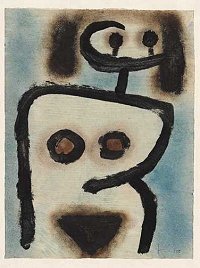
Paul Klee
(1879-1940)
Warum machst du das, Bimbo
Warum machst du das, Bimbo,
grad an der Tür?
«Das der wißt, was da ist!»
Ein Fogel feift ein lid auf sein
Schnabel, hohe Döne.
Paul Klee poetry, 1933
fleursdumal.nl magazine
More in: Archive K-L, Expressionism, Klee, Paul

Paul Klee
(1879-1940)
Was bildet der Künstler?
Was bildet der Künstler?
Formen und Räume!
Wie bildet er sie?
In gewählten Proportionen . . .
o Satire,
du Leid der Intellektuellen.
Paul Klee Gedicht, 1905
fleursdumal.nl magazine
More in: Archive K-L, Expressionism, Klee, Paul

Paul Klee
(1879-1940)
Ich bin gewappnet
Ich bin gewappnet,
ich bin nicht hier,
ich bin in der Tiefe,
bin fern –
ich bin so fern –
Ich glühe bei den Toten.
Paul Klee Gedicht, 1914
fleursdumal.nl magazine
More in: Archive K-L, Expressionism, Klee, Paul
Thank you for reading Fleurs du Mal - magazine for art & literature